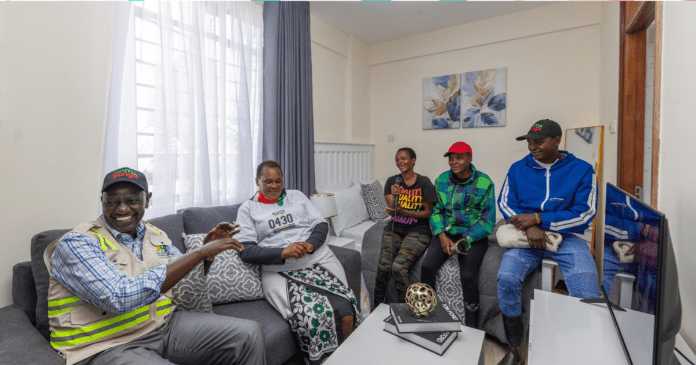A storm has been brewing on social media following President William Ruto’s recent handover of 1,080 units in the New Mukuru Housing Estate (Lot 1) as part of the government’s Affordable Housing Programme.
The ceremony, marked by pomp and fanfare, was lauded by many, but not all were clapping.
The newly launched units include over 5,616 bedsitters, with 3,024 one-bedroom houses under construction in Lot 2 and 4,608 two-bedroom units in Lot 3. Mukuru, Ruto said, is just the beginning.
“This is Kenya’s Bottom-Up Moment! These are not just keys to houses; they are keys to homes,” the president declared.
But amidst the celebrations, a fierce debate erupted online after a user identified as Makau F. Mully took issue with one detail: the government had allocated a bedsitter to a mother.
“Government giving a bedsitter to a family woman is an international shame,” he wrote on X (formerly Twitter).
Adding:
“There’s a reason why Jomo Kenyatta built two-bedroom houses in California, Moi did the same in Pumwani Highrise, Kibaki built well in Kibra, and Uhuru in Pangani.”
Makau’s comments were triggered by a viral video snippet showing a cheerful woman celebrating her new house and praising the government.
“Hadi kuna choo na bafu ndani, sio kama Mukuru slum penye tunaweka weka leso itufiche ndio tuonge. (There’s even a toilet and bathroom inside, unlike in Mukuru slums where we had to hang lesos for privacy ”),” she said.
While some applauded Makau’s stance, arguing that a bedsitter lacks dignity for a woman with a family, others rushed to defend the program—calling it a monumental improvement for slum dwellers.
Here are some of the reactions:
@C_Roiginson:
“It’s to make it affordable. That bedsitter costs KSh 680,000. If Wanjiku doesn’t have the cash, she can pay KSh 3,890 monthly under a rent-to-own plan. Quality of life will improve. Slums have no water, toilets, or security.”
@silashonestug:
“It’s called affordable housing. It’s what the family can afford.”
@kheedpau2:
“You clearly don’t know what a bedsitter means to this woman. Ask someone who has lived in Mukuru—it’s everything.”
@MumbiJosphen:
“This thing of celebrating mediocre achievements by a mediocre government must stop. With all the taxes they collect, they should do way more.”
@JimNairobi1963:
“This ‘house’—sorry, dog kennel—is a human rights violation. A toilet opening into the living space? An open kitchen next to the toilet? We’re marinating in toilet odors here!”
@Wanjiku Gikonyo:
“Let’s understand the context. Many lived in single rooms with shared, grimy toilets. To them, this is an upgrade. But how much rent are they actually paying?”
@JackSparrowYaye:
“Millions of mothers live in cramped mabati houses. I was there 25 years ago.”
@Bilharzi:
“I don’t hear complaints from the woman receiving the house. Instead, I hear joy. That’s enough.”
@BensonMat:
“What if she bought what she could afford? Anyone who’s been to Kibera or Mukuru knows this is incomparable. Don’t live in isolation, Mwanaiya.”
@rmuriuki:
“This is just another slum—just vertical now. I thought this was to improve living, not structure. How does a whole family survive in one room?”
@BgOkiiry:
“She must have come from a 3-bedroom maisonette for this to be a ‘shame’. Some of us just want to hate on the government for existing.”
@thebigtall2:a
“Not everyone grew up in a mansion. If you’ve lived in slums, this is heaven.”
@RonnyRon:
“No overhead shelves? Poor workmanship. Are we just building vertical slums?”
@NicholasAbbey:
“You are the real international shame. From a mabati shack to this is huge. But you wouldn’t know, you’ve never lived that life.”
The numbers behind the project
The Mukuru social housing units were designed for families earning up to Sh 20,000 a month. Prices are as follows:
Bedsitter (20m²): Sh 640,000
1-bedroom (28m²): Sh 960,000
2-bedroom (30m²): Sh 1,280,000
To qualify, a buyer must raise a 10% deposit. Rent-to-own options are also available.
President Ruto’s vision
“They called me a liar; now I am here to deliver. We’re employing over 200,000 youth through this project. This is the biggest real estate site in Kenya’s history, 13,248 units. More than 200 projects are in the pipeline across the country. We are providing sanitation, security, and dignity to ordinary Kenyans.”









